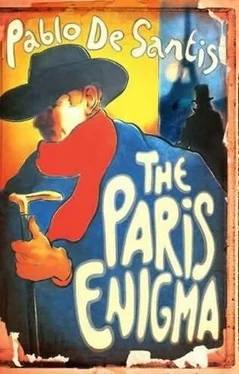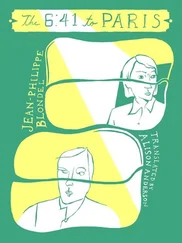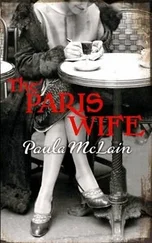Mario Baldone raised his voice so he could be heard over the murmuring.
“Dear sirs, I would like to welcome Sigmundo Salvatrio, from the Argentine Republic, who has come on behalf of the founder of The Twelve Detectives: Renato Craig.”
Everyone applauded upon hearing Craig’s name, and it was gratifying for me to see how respected my mentor was. Stammering in French, I explained that I was inexperienced, and that only a series of unfortunate coincidences had brought me there. My modesty made a good impression among those around me: in that moment I saw a tall Japanese man at the back of the room, who wore some sort of blue silk shirt with bright yellow details: it was Okano, the assistant to Sakawa, the detective from Tokyo. Okano looked to be one of the youngest-he must have been about thirty years old-but it has always been hard for me to guess the age of people from the Orient. They always seem younger or older than they actually are, as if even their features speak an exotic foreign tongue.
Problems always bring us around and keep us alert, but when everything’s going well, as on that night, we forget about possible dangers. They served me cognac, and since I’m not used to drinking, I overdid it somewhat. Modesty began to seem insipid and I thought it was time to highlight a few of my virtues. I left out the fact that I was a cobbler’s son, but I did mention my skill with footprints.
“Those are qualities of a detective, not an assistant,” said Linker. I looked at his too-pale eyes, and I recognized, luckily not aloud, that his imitation of a dullard was perfect.
But he wasn’t the only one who was bothered by what I had said.
“Where did you learn these skills?” asked Arthur Neska, Louis Darbon’s assistant, from a doorway, as always.
I should have kept my mouth shut, but alcohol loosens the tongue and firmly ties up the mind.
“In the Academy,” I said, “Detective Craig taught us all types of investigative methods, including the principles of anthropological physiognomy.”
“But is it an academy for assistants, or for detectives?” asked the German.
“I don’t know, Craig never said. Perhaps he was hoping to train such good assistants that they could become detectives themselves someday.”
I had never in my life heard such a deep silence as the one that followed my words; the effect of the alcohol wore off abruptly, as if their reaction was a splash of cold water. How could I explain to them that it was the cognac, not me? How could I tell them that I was from Argentina and geographically doomed to talk more than I should? The Japanese assistant, who up until that moment had been watching everything as if he couldn’t understand a word, left so distressed that I thought he had gone to find his sword, so he could stab me, or stab himself, I wasn’t sure. Linker looked me in the eyes and said, “You’re new and so we’ll forgive your lack of information, but remember this as surely as you remember that fire burns: no acolyte has ever become a detective.”
I wasn’t going to open my mouth, not even to apologize, out of fear that even my apology would be inadequate. But then Benito, the black Brazilian, recalled, “Yet they always said that Magrelli, the Eye of Rome, started out as an assistant…”
It was clear that he had brought up an old matter that everyone was familiar with-familiar but unmentionable-because as soon as Benito opened his mouth Baldone went straight for his neck, as if Benito had insulted his mentor. He took out a sailor’s knife with a curved blade, and brandished it in the air, searching for the black man’s neck. The German and the Spaniard managed to hold him back.
Baldone had given up on French-the detectives’ international language-and was swearing in a Neapolitan dialect. Benito backed up slowly toward the exit, without turning his back on the Italian, afraid that he’d escape the others’ hold and attack him again. When he was out of sight, Baldone calmed down.
“Maledetto Benedetto.”
Linker, the German, said, almost into my ear, “That is an old, unfounded rumor. There are rumors about all the detectives, but we never repeat them.”
Baldone regained his momentum, asserting, “Of course we shouldn’t repeat them! There have always been rumors, but we never believed them! I’ve heard gossip about every one of the detectives: that this one is a morphine addict, that one learned everything he knows in prison, the other one isn’t interested in women at all! But I would cut out my own tongue before spreading them! ”
Some of the arrows had hit their mark because now Neska and Araujo and even Garganus leaped on the Italian as if they were going to rip off his mustache. Baldone was brandishing his knife again, moving it from one side to the other, in such an exaggerated way that for a moment I feared he was going to end up hurting himself. A statue of the goddess Minerva that decorated a corner of the room received an unintentional thrust of his blade. Everyone was worked up, except for Tamayak.
Just then a calming voice was heard. It was deep and wise, but at the same time a bit slow. It could just as easily make you fall asleep as get your attention. It was Dandavi, Caleb Lawson’s Hindu assistant. In the midst of the argument we hadn’t noticed his arrival, in spite of the fact that his clothes were hard to miss. He wore a yellow shirt and turban, with a gold chain around his neck. He looked at all of us as though he could read what was written in our hearts. He spoke for a long time, his words sketching vast generalizations. I only remember the last thing he said:
“There is nothing wrong with a detective having been an assistant. We are all assistants. And who among us has never dreamed of becoming a detective?”
Those words sank the men into a state of confused melancholy. Baldone, seeing that the others had abandoned their bellicose stances, put away his knife. The tips of his mustache, usually smoothly waxed, now drooped toward the f loor. Some men went back to their armchairs, to their drinks, to the conversation they had abandoned; others decided to go off to bed. I was glad to know that they weren’t so different from me: we all dreamed of the same things.
The tower looked finished, but there was still movement up at the top. The machinists, organized into groups of four, continued to replace the provisional rivets-coldfitted-for the definitive ones, which were heated to red-hot and fitted with whacks from a drop hammer. Over the two years of the construction, there had been plenty of problems: some of them were minor, like the f laws in the protective railing, which was being replaced, and others were more serious, like the labor union disputes that threatened to halt the project, or the problems getting the elevators to go up along the diagonal. In his statements to the press, Alexandre Eiffel seemed more confident about dealing with the engineering problems than with his enemies: the tower had been attacked by politicians, intellectuals, artists, and members of esoteric sects. But one thing was sure: the taller it grew, the more the problems faded into the distance. Now that it was almost completed, the voices that opposed it no longer resounded with the fury that leads to action, but with nostalgia for a lost world. The same thing had happened with the union. It was more difficult to work at a thousand feet high than at a hundred and fifty or three hundred, because of the vertigo, and the freezing winds. But the laborers, so unruly close to the ground, became more obedient the higher they climbed, as if they considered the tower a personal challenge and had reached a place of proud solitude that no longer tolerated the complaints of the herd. Like a good engineer, Eiffel knew that sometimes difficulties made things run more smoothly.
Читать дальше












